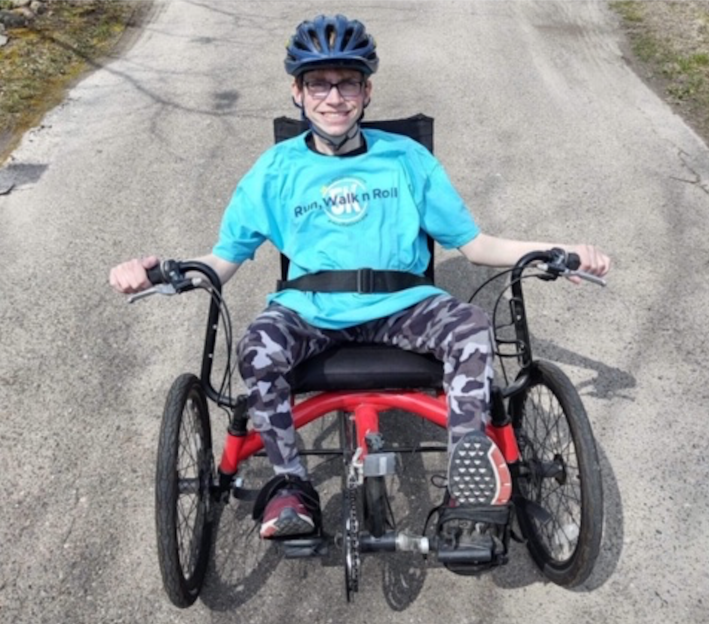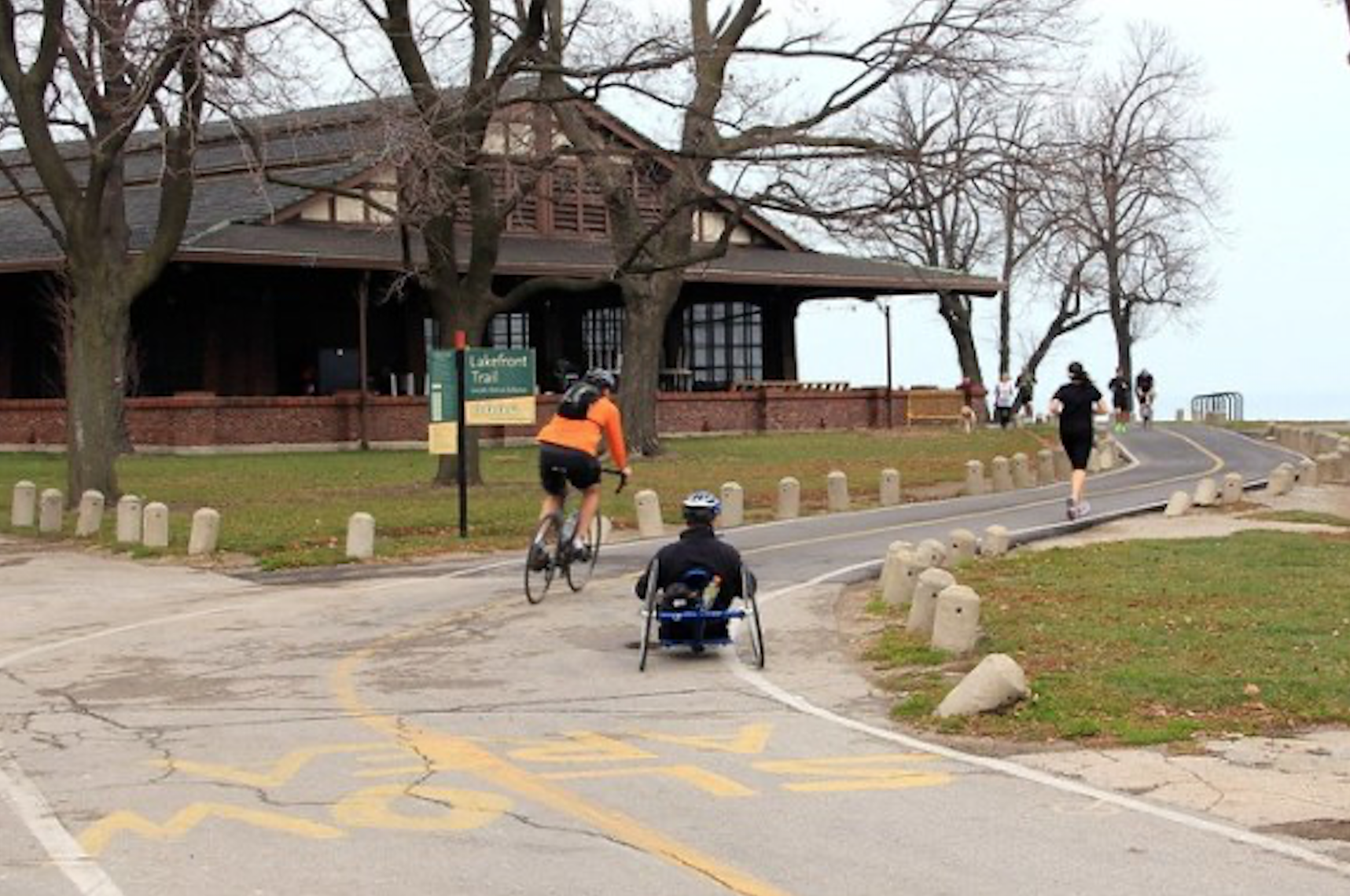Update 8/26/20: Chicago Park District spokesperson Michele Lemons confirmed that no exceptions to the lakefront parking ban are made for people with disabled parking placard who wish to use the Lakefront Trail. "The only exception is parking designated for harbors and lakefront golf courses to allow boat owners and golfers access to these facilities during hours of operation." She also clarified that parking is not available for people patronizing lakefront restaurants, bars, and concessions stands. This article has been edited accordingly.
This year Mayor Lori Lightfoot closed the lakefront on March 26 as a pandemic safety measure. Although she reopened the Lakefront Trail on June 22, and harbors, golf courses, and many lakeside bars and eateries are currently open (the beaches are still off-limits), lakefront parking lots remain closed to the general public as a strategy to prevent unsafe crowding.
In general Streetsblog Chicago supports this policy, although the site has called for making an exception for people with disabled parking placards, as well as increasing CTA bus service to the lake to reduce inconvenience for other residents who live far from the shoreline and are used to driving there.
However, in at least some cases city staff haven't been allowing Lakefront Trail users with disabilities to use the lots. The trail is an important resource for physical activity and recreation, and for disabled Chicagoans who don't have air conditioning or backyards, the lakefront may be their best bet to cool off during the city’s hot summer days.
While access to lakefront parking lots and curbside spaces on park roads is currently controlled with gates and/or sawhorses, police and security guards allow motorists to pass if they are heading to the marinas and golf courses. But Laurie Dittman, senior policy analyst at the Mayor’s Office for People with Disabilities indicated that parking is not currently available for any trail users, even those with disabilities. She said that she had not heard any reports of people with disabilities having difficulty accessing the lakefront.
But I know from personal experience that the parking ban has been a barrier for disabled Chicagoans this summer. In early July, I drove with my family, including my brother Larry, who uses a wheelchair, to the lakefront, only to be told by city staff monitoring the lots that no exceptions were being made for people with disabled parking placards. When we asked for suggestions on what to do, they looked confused. “I don’t know,” one person finally said. Fortunately we were able to find street parking for our large, wheelchair-accessible van a 15-minute walk away, and we were able to push my brother in his wheelchair. But if he had been on his own, he wouldn't have been able to make it to the shoreline.

Others have reported lakefront disability access issues as well. Last month, T.J. Gordon, Jr., a cofounder of the Chicagoland Disabled People of Color Coalition and "autistic self-advocate," walked with his girlfriend and her child to the lakefront near North Avenue Beach for some fresh air. On their trip back, they encountered an accessible sidewalk that had been blocked off, in what looked to be an effort to promote social distancing and lower trail use. This forced the couple to push the child’s stroller through the grass. Gordon noted that the closure would have been a significant barrier for a person using a wheelchair.
“Going to the lakefront is a stress reliever for people with disabilities in general, especially people of color with disabilities,” Gordon said said. “If people can’t access the lakefront... then they have fewer places to go to de-stress. I’m all for social distancing while exercising and enjoying the lakefront, but we've got to make sure that... everyone has equitable and equal access."
Sam Lenser, a wheelchair user with an autoimmune disorder, lives four blocks from the lakefront. Due to his health situation, Lenser said, “I can no longer take public transportation safely or use ride-shares, so we're dependent on our car for... transportation.” Before the pandemic, he and his partner were in the habit of visiting suburban forest preserves. Now, they visit the lakefront almost daily. Lenser said he feels lucky that his close proximity to the shoreline makes this possible.
“The lakefront allows me to connect with nature and gives me a break from the longterm isolation that comes with being on immunosuppressants during a pandemic,” he said. “Right now, the isolation and lack of basic resources most of us [who are disabled] are facing is unimaginable." He said that the Lori Lightfoot's administration's apparent oversight on the issue of parking access for disabled Chicagoans is an example of the mayor falling short on ADA issues during the crisis. "It feels like people with disabilities are being forgotten about during COVID, when we need accessibility the most."
The Americans with Disabilities Act turned 30 on July 26th of this year. The act, a landmark for disabled people (“We call it our ‘Bill of Rights,’” wrote Lenser.) “guarantees equal opportunity for individuals with disabilities in public accommodations, employment, transportation, state and local government services, and telecommunications,” according to the ADA National Network. The lakefront parking ban is technically not in violation of the ADA because it prohibits all parking. But that doesn’t mean that the ban is impacting all residents equally.
“Obviously, this [ban] creates some hardship/disadvantages to persons with disabilities, but the ADA addresses parking as an ‘equal access issue’ in that where parking is provided to others, it must be provided to persons with disabilities," said Robin Jones, director of the Great Lakes ADA Center. "If there is no public parking for anyone, then individuals with disabilities are subject to this same requirement and situation where no parking is available, even to them. While we know this seems to be ‘unfair’ and may restrict access for persons with disabilities, the ADA does not provide for a situation where parking must be provided for persons with disabilities when it’s not available to the general public.”
Still, Charles Petrof, senior attorney with Access Living of Metropolitan Chicago said, "The city has the responsibility to accommodate people with disabilities when it can be done reasonably. At this point in the pandemic, it's important to consider the access rights of people who need accessible parking spaces to use the Lakefront. Reopening these spaces is reasonable as long as it doesn't compromise social distancing on the Lakefront."
If it is in fact the case that there is currently no exception on the lakefront parking ban for people with disabled parking placards, hopefully the city will rethink that policy. In the meantime, Pace’s Taxi Access Program, which allows paratransit-eligible riders to hail a Chicago taxi (where they can ride alone, reducing their risk to COVID exposure), is waiving fares over three dollars and up to thirty. “We encourage registered ADA Paratransit passengers traveling in Chicago to take advantage of TAP if they are able,” wrote Pace spokesperson Maggie Daly Skogsbakken. To schedule a ride to the lakefront (or elsewhere) or to enroll in TAP, visit the website here.






